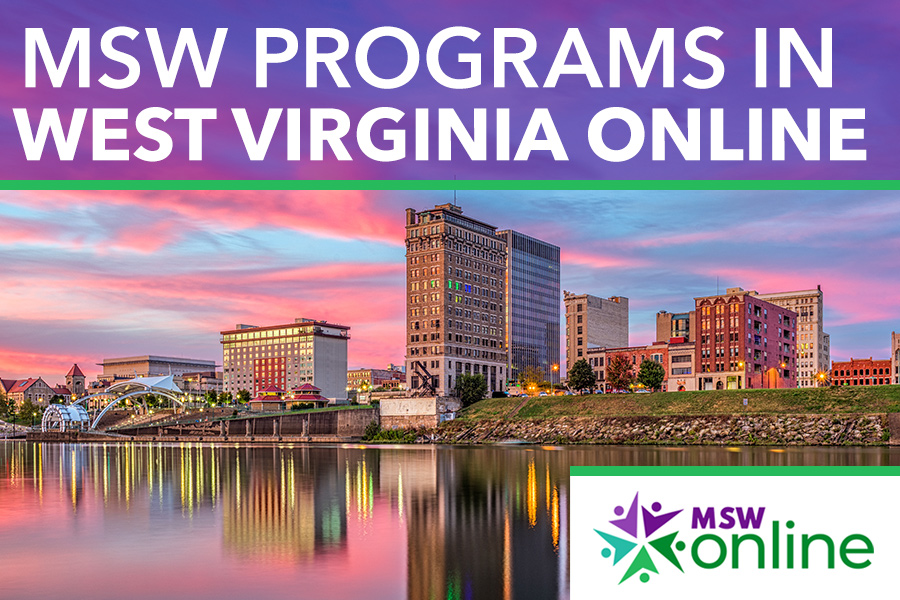MSW Programs in West Virginia Online

West Virginia’s mountainous terrain and tight-knit rural communities have shaped a focused but meaningful landscape for Master of Social Work (MSW) education, with two universities currently offering online MSW programs that serve the state’s unique geographic and social challenges. West Virginia University provides a fully online asynchronous MSW program designed for students who cannot attend on-campus classes, while also offering in-state tuition rates regardless of residency, and Concord University offers a CSWE-accredited MSW program with an advanced generalist, rural focus that prepares students to work in diverse communities. For residents seeking additional options, numerous nationally accredited online programs welcome West Virginia students and provide the flexibility needed to serve communities across the state’s challenging terrain while maintaining current employment in often resource-limited settings.
West Virginia’s social work education landscape directly addresses the Mountain State’s most pressing needs, including substance abuse treatment, rural healthcare access, economic revitalization, and support for aging populations in isolated communities. These programs emphasize Advanced Integrated Practice curriculum that includes both clinical training and macro-level community work, incorporating digital literacy to prepare graduates for 21st-century practice, particularly relevant given West Virginia’s geographic barriers to service delivery. MSW graduates in West Virginia prepare for state licensure as Licensed Clinical Social Workers (LCSW) and other credentials while entering a practice environment that demands creativity, resourcefulness, and deep community engagement. The state’s ongoing efforts to address opioid addiction, rural healthcare shortages, and economic transition create essential career opportunities for MSW-trained professionals committed to serving West Virginia’s resilient communities and tackling the complex social issues that accompany geographic isolation and economic challenges.
2026 Best West Virginia MSW Programs Online
Concord University
Athens, WV - Public 4-Year - concord.edu
Master's - Master of Social Work (rural practice)
Online Learning - Visit Website
Concord University's online Master of Social Work (MSW) program specializes in rural practice, equipping students with advanced generalist skills for diverse community settings. The curriculum focuses on social justice and comprehensive interventions across individual, family, group, and community levels. With flexible full-time or part-time tracks, it offers two entry paths for students with or without prior social work backgrounds, requiring 60 credits for the generalist track and 36 for the advanced track. No entrance exam is required for admission. The program is fully online, with start dates in Fall and Spring, and application deadlines on April 15 and November 15, respectively.
- Fully online MSW program
- Rural practice specialization
- Two program entry paths
- Fall and Spring start dates
- Full-time and part-time options
- Advanced generalist curriculum
- Application deadline: Fall - April 15
- Application deadline: Spring - November 15
- 60 credits for generalist track
- 36 credits for advanced track
List of West Virginia Online MSW Programs
Athens, WV
Concord University
- Master's - Master of Social Work
Concentration: rural practice - Online Learning - Website
- Master of Social Work degree
- Rural practice concentration
- 60 credit hours required
- Foundation and advanced curriculum
- Advanced standing available
- BSW graduates may qualify
- Generalist practicum required
- Advanced practicum required
2026 Affordable Online West Virginia MSW Program Options
| Concord University |
|
|
List of West Virginia Advanced Standing Online MSW Programs
Online Advanced Standing MSW programs in West Virginia offer an expedited educational track for BSW graduates from CSWE-accredited institutions, enabling them to earn their master’s degree through a condensed academic program. These programs prepare students to handle things such as coal mining community transition, substance abuse recovery services, and Appalachian cultural competency to serve West Virginia’s mountainous regions, former industrial towns, and the unique challenges facing rural populations throughout the Mountain State’s evolving economic and social landscape.
Athens, WV
Concord University
- Master's - Master of Social Work (MSW)
Concentration: Rural Practice - Online Learning - Website
- CSWE-accredited MSW program
- Specialization in Rural Practice
- Completely online format
- 2-year full-time completion
- Part-time options available
- Advanced standing for BSW holders
- Supervised field practicum included
- Focus on systems and strengths perspectives
Huntington, WV
Marshall University
- Master's - Master of Social Work (MSW)
Online & Campus Based - Website
- Accredited by CSWE
- Behavioral Health specialization
- Flexible full-time and part-time options
- Two-year full-time completion
- In-person classes in Huntington
- Focus on social justice
- Prepares for clinical practice
- Generalist and Advanced tracks
- Master's - Master of Social Work (MSW)
Concentration: Behavioral Health - Online & Campus Based - Website
- Hybrid program format.
- Behavioral Health concentration.
- Full-time or part-time options.
- CSWE accredited.
- Focus on social justice.
- Prepares for clinical practice.
- Emphasizes health equity.
- For BSW or related degree holders.
Morgantown, WV
West Virginia University
- Master's - Social Work MSW – Advanced Standing
Online Learning - Website
- 36 Credits
- $705 per credit
- Online asynchronous
- Field placement included
- Advanced Standing option
- CSWE-accredited
- 2.75 GPA minimum
- Three recommendations required
2026 Affordable Online West Virginia Advanced Standing MSW Programs
| Marshall University |
|
|
| West Virginia University |
|
|
| Concord University |
|
|
